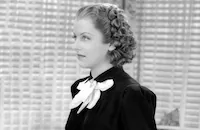Renegades of the West

Brief Synopsis
Cast & Crew
Casey Robinson
Tom Keene
Rosco Ates
Betty Furness
Carl Miller
Max Wagner
Film Details
Technical Specs

Synopsis
In 1880, Curly Bogard hires cowboy Tom Bigby to be a part of his cattle rustling gang, then sends him to see Dr. Fawcett about his bad cough. The doctor recognizes Tom's cough as a symptom of prison life and tells his daughter Mary, with whom Tom had been flirting, his findings. Before moving to Curly's ranch, Tom checks in with lawyer James Dowling and informs him that, while serving six months in jail on phony charges, he learned from his prison cellmate, Blackie, that Curly Bogard was connected to his rancher father's recent murder. Determined to find his father's killer, who he suspects is the man behind the rustling gang, Tom ingratiates himself with Curly, impressing the rustler with his riding and shooting skills. Then, to be close to Mary, who has since snubbed him, Tom agrees to judge a baby show in which she is involved. After Tom has viewed all of the babies in the show, which offers a one-hundred-dollar prize to the parents of the cutest baby, a man rushes in to enter an abandoned baby boy in the contest. Immediately taken with the toddler, Tom announces to the crowd that he is adopting the child and awards himself the prize money. Tom is chased by the marshal and a group of angry, gun-toting parents and returns to Curly's with the baby. Curly at first rejects the boy, but when the child inadvertently executes a spoon trick that Curly has been trying to perform for years, he embraces him as his own. While Curly and banker Rankin, the true head of the operation, plot their next raid, Tom breaks into Curly's safe to procure evidence of their illegal activities. As Rankin and Curly argue about Tom's assignment, Blackie, who has escaped from jail, arrives and reveals Tom's identity to the rustlers. Tom is apprehended, but eventually overwhelms his captors in a fierce fight and forces a confession of murder out of Rankin. Although a reformed Curly gives himself up, he is shot by one of his men while trying to protect Tom. Following a pursuit by Curly's men, Tom turns Rankin and the evidence over to the marshal, then rushes Curly to Dr. Fawcett's house, where he dies a short time later. Encouraged by her father, Mary agrees to become the baby's adopted mother and Tom's wife.

Director
Casey Robinson
Cast
Tom Keene

Rosco Ates

Betty Furness

Carl Miller
Max Wagner
Rockcliffe Fellowes
Roland Southern
Jules Cowles
Joe Girard
Jack Pennick
Josephine Ramos

Bill Franey
Crew

Film Details
Technical Specs

Articles
Renegades of the West
Based on a 1921 short story entitled The Miracle Baby that had previously been filmed under that title in 1923, starring Harry Carey, Renegades deals with cattle rustlers, a man seeking revenge for his father's death, and, yes, an adopted baby. Variety was lukewarm: "Tom Keene is satisfying..., while [leading lady] Betty Furness has little to do."
This was the only feature ever directed by Casey Robinson. He had previously directed a handful of musical and comedy short subjects, but was best known as a writer. Later in his career, in fact, he would claim some important films to his credit as a screenwriter, including Captain Blood (1935), Dark Victory (1939), Kings Row (1942), Now, Voyager (1942), Passage to Marseille (1944), and While the City Sleeps (1956).
Following his RKO westerns, Tom Keene starred for King Vidor in the classic Our Daily Bread (1934) before returning to the world of B westerns -- including some good titles for Monogram such as God's Country and the Man (1937). After two years off for a stint as Honorary Mayor of Sherman Oaks, Calif., Keene resumed his career with another round of westerns before rechristening himself "Richard Powers." Under that name, he took on much smaller roles as a character actor at several studios, sometimes in major films, though he also made a 12-part western serial for Republic called Desperadoes of the West (1950). He used the moniker "Tom Keene" again on his final film, Ed Wood's infamous Plan 9 From Outer Space (1959).
By Jeremy Arnold
SOURCES:
Victoria Balloon and Bob Campbell, "A Bijou Flashback: The Three Faces of Cowboy Star Tom Keene," www.moviefanfare.com
Buck Rainey, Serial Film Stars: A Biographical Dictionary, 1912-1956

Renegades of the West
Quotes
Trivia
Notes
Although the Motion Picture Herald release charts state that the film was reviewed in their November 26, 1932 issue, no review was located. In 1923, R-C Pictures produced The Miracle Baby, a silent version of Frank Richardson Pierce's story, which was directed by Val Paul and starred Harry Carey (see AFI Catalog of Feature Films, 1921-30; F2.3637).














